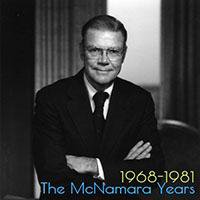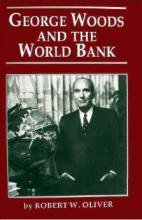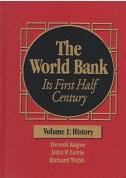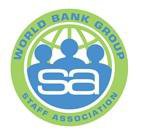
Collection
-
World Bank Group Archives Oral Histories
As early as 1947, the Secretary, Morton Mendels, wrote a memo to the Vice President, Robert L. Garner, saying that “it seems timely to begin a history of the Bank.” However, it was not until 1961, at the initiative of Harold E. Graves, Director of the Office of Information, that a series of tape-recorded interviews were made with key officials of the Bank in preparation for this yet unrealized history. These 1961 interviews, conducted by Robert W. Oliver, describe the World Bank during the presidencies of Eugene Meyer, John McCloy, and Eugene Black. The Bank turned to the Oral History Research Office at Columbia University to produce the transcripts; the Office retained the tapes and transcripts and returned a set of the transcripts to the Bank. These transcripts later were used by Edward S. Mason and Robert E. Asher to write The World Bank since Bretton Woods (1973), the official history of the first 25 years of the Bank.
A second oral history program was carried out in the 1980s. In 1981 the World Bank asked Robert Asher to suggest what would constitute a successful oral history program for the World Bank. Asher contended that oral history is a necessary adjunct to written records as “the inclusion of atmosphere in an office memorandum is considered a waste of words.” Between 1981 and 1989 nearly 40 interviews were conducted, principally by staff members of the WBG Archives but also by consultants.
In 1988, anticipating the 50th anniversary of the World Bank Group, William Diamond proposed that an overall history of the World Bank’s first half century be prepared and both the Archives and the oral history program be strengthened. The Bank’s management agreed and created an Office of the Historian in 1993 as part of the Personnel and Administration Vice Presidency, with Jochen Kraske as Historian. One of its responsibilities was to manage an oral history program. Office staff members and consultants interviewed senior staff and executive directors on a systematic basis. The Office of the Historian was abolished in 1998 and its oral history project was transferred to the WBG Archives, where it continued conducting interviews with limited resources.
In 2003, the Bank asked an oral history consultant to review the program and recommend changes that would broaden the Bank’s efforts to collect, retain and share knowledge. After the report was received, the fourth phase of the oral history program began. The program continues to record interviews as resources are available, with a focus on senior leaders of the Bank, including Presidents, who have recently retired or otherwise separated from the World Bank Group.
-
Interviews on the McNamara Years (1968-1981)
From 2016-2018, the World Bank Group Archives partnered with 1818 Society to collect interviews for a special oral history project on the McNamara Years. The interviews, led by John Heath, capture a social history of the experiences of staff during President Robert S. McNamara’s tenure (1968-1981). Interviewees reflect on their memories of events that happened over 40 years ago and offer a detailed picture of how President McNamara shaped this institution.
-
Interviews by Robert Oliver for George Woods and the World Bank
George Woods, the fourth President of the World Bank Group, was instrumental in shifting the World Bank’s focus from strictly infrastructure work to development issues. Following his death in 1982, his widow, Louise Woods, wanted to have a biography written about him. She selected Robert Oliver, a professor of economics at the California Institute of Technology (Caltech) who wrote a book on the Bank and did many interviews for the Bank as a consultant, to write the biography of her late husband. Between 1985 and 1986, Oliver interviewed 38 World Bank staff. The interview tapes produced some two thousand pages of transcribed conversations.
These interviews differ from the World Bank Group Archives Oral Histories in that they have a specific purpose, namely to create a picture of George Woods. However, as many of the interviewees for this biography were present since the Bank’s inception, the interviews also paint a picture of the institution itself and its evolution under Woods’ presidency. The title page of these transcripts will include the phrase "Conversations about George Woods and the World Bank."
-
Interviews for The World Bank: Its First Half Century
In 1988, anticipating the 50th anniversary of the World Bank Group, William Diamond, whose career at the World Bank spanned from 1947 to 1978, proposed that an overall history of the World Bank’s first half century be prepared and both the WBG Archives and the oral history program be strengthened. Following this recommendation, the Bank contracted with Brookings Institution to write the history, which was published in two volumes as The World Bank: Its First Half Century (1997). John Lewis of Princeton University and Richard Webb from Peru were engaged as the principal authors, with Devesh Kapur later named as a co-author. As part of the research, the team conducted hundreds of interviews, including a series in Indonesia, Bangladesh, The Philippines, and India. They also interviewed the four living World Bank presidents - Robert S. McNamara, Alden W. Clausen, Barber B. Conable and Lewis Preston - providing the only interviews with these men that are held by the WBG Archives.
These interviews are not formal oral histories nor are they a systematic overview of the work of the person interviewed. At times the authors discuss the planned publication itself and the sources that should be consulted; at other times they talk about persons and publications extraneous to the Bank. Some interview tapes and transcripts begin and end abruptly. Each of the transcripts indicates which of the authors conducted the interview. Not all interviews were recorded, particularly those conducted during the first year of the team’s work, but notes of these interviews were prepared.
-
World Bank Group Staff Association Oral Histories
The World Bank Group Staff Association was founded in 1972 during the presidency of Robert S. McNamara. It had two broad objectives: fostering a sense of common purpose among staff in the promotion of the aims and objectives of the World Bank Group; and promoting and safeguarding of the rights, interests, and welfare of staff.
This collection includes interviews with various chairmen who were instrumental in creating the Staff Association and its administration. While these interviewees also discuss their own specific careers, the goal of these oral histories is to chronicle the history of the World Bank Group Staff Association.




